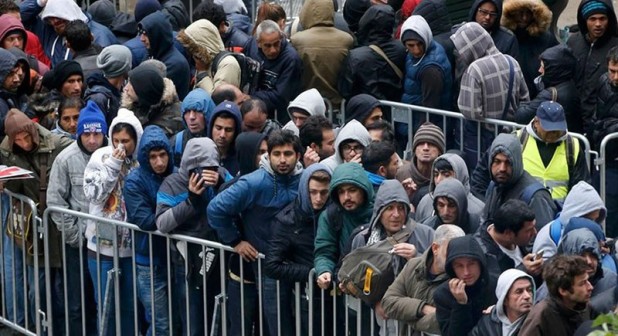The New Observer
February 25, 2016
The German government has sent letters of complaint to seventeen Third World countries which have refused to take back their nationals who have had their “asylum” applications rejected in Germany.
After inviting the entire Third World into Germany, the Angela Merkel government has found that hundreds of thousands of them have not come from “war zones,” and were simply opportunistic invaders seeking to parasite off and criminalize white European society.
The letters of complaint were mostly sent to capitals in North and West Africa and in the Indian sub-continent, the German newspaper Die Welt has reported, adding that the government is “desperately trying to find solutions to deport the hundreds of thousands of migrants who have had their asylum applications rejected.”
Last year only 21,000 of the 200,000 “asylum seekers” whose applications were rejected left the country, meaning 179,000 remain in Germany as so-called ‘tolerated’ people.
Most of the 1.5 million nonwhite invaders who entered the Federal Republic during the course of the year still to have their applications decided on, so this number is set to grow exponentially.
The most common reason why Germany cannot deport people is that as many as 70 percent of the invaders arrive in the country without official documentation, making it extremely difficult for the government to find out where they are originally from.
But even if Germany does know where an invader originally comes from, the problem of returning them home often does not end there.
States like Pakistan, Algeria, and Tunisia simply refuse to cooperate with German authorities, despite being obliged by international law to comply.
Pakistan is particularly problematic. In 2014 there were only two deportations to that country despite 580 people having their applications rejected. In 2013, 533 Pakistanis had their asylum applications rejected but only three of them were sent home.
Local authorities often didn’t chase up German inquiries about invader’s identities because they involved long journeys into distant parts of the country, Die Welt writes.
North Africa is another problem region. Interior Minister Thomas de Maiziere is travelling to the region at the end of the week to try and convince governments there to start taking back more invaders.
With North Africans the problem is particularly urgent because migrants from there have often been associated with crime.
In Saxony, where the majority of Tunisian invaders are sent, authorities have reported that while Tunisians make up 4 percent of the migrant population, they are found guilty of a quarter of crimes committed by the invasion population.
Tunisians almost never have their asylum applications granted—only 0.2 percent are successful. Nonetheless, of the 678 Tunisians told they wouldn’t be allowed to stay in Germany, only 66 were deported in 2015.
Meanwhile the majority of invaders from Morocco and Algeria have until recently been sent to North Rhine-Westphalia. Current investigations into robberies and sexual assaults during New Year’s Eve show that most of the suspects for these crimes came from these two countries.
Die Welt reports that there are several factors at play regarding why countries are so reluctant to take back their citizens. For some it means the tiresome bureaucracy involved in tracking down their identity papers in chaotic state registers to verify their identity.
The illegal migrants are often also a boon for these developing countries if they stay abroad—as when they “earn” money in Euros they send part of it back to their families and feed into the local economy. This “earning” is, more often than not, either welfare payments or the proceeds of crime.
 Daily Stormer The Most Censored Publication in History
Daily Stormer The Most Censored Publication in History



